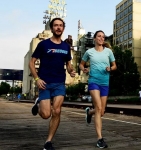‘Brave Like Gabe’: Remembering the Runner Who Never Gave Up in the Face of an Unbeatable Opponent

Gabe spent the last years of her life fighting, living, running… inspiring others… fully aware that she was not winning her own fight, but fighting ever harder just the same.
By Tim Layden, Sports Illustrated
On a June night two years ago, I went to dinner with Gabe & Justin Grunewald at a casual, funky place in downtown Minneapolis, a place with a solid draft list and an unpretentious menu. They picked it out, because I was the visitor. Gabe ordered the pulled pork sandwich and devoured it. Justin and I each got a beer and a burger, both of which were excellent. On TV screens around the room, the Warriors were finishing off the Cavaliers in Game 5 of the NBA Finals. It was a fun night, even with my phone in the middle of the table, recording everything. Even with my notebook at the ready. Even with the subtext of our presence in each other’s company, which was that Gabe was fighting a terrible cancer and I was writing a story about that fight. The best interviews are like hanging out with new friends of whom you can ask anything; this was like that. Somehow.
That dinner was on the fourth of five days I would spend with Justin and Gabe. I first met up with them in Boston, for a race that didn’t go well for Gabe. And then in Nashville, for another race that also did not go well. Gabe was in the early stages of a chemotherapy program which would not be shown effective at improving her health but was hell on her training and racing. I followed them back to Minneapolis, doing my reporter thing. On a warm, hazy Sunday evening, they ran together along the Mississippi River and back and forth over a few of the bridges that cross it. Long past my running prime, I rode along on a mountain bike and asked questions. We spent a chunk of the next day with Gabe’s family—her father Kim, a physical therapist; and her mother, Laura; a brother and a sister. Gabe sat across from me at a high table in her and Justin’s apartment in the shadow of the Vikings’ U.S. Bank Stadium, and explained every detail of her eight years battling adenoid cystic carcinoma, a rare cancer with no course of treatment and no cure. Yet.
In all of this, Gabe—born Gabriel Anderson because her mom loved Biblical names, and which Gabe later lengthened herself with an “e” on the end, because she liked that even better—was an unflinching narrator of her own journey. This was a decision she had made, to share the details of her illness and her fight, in hopes that it might help shine a light on diseases that don’t come with pink bows or 5K runs and that others might draw strength from her strength, though she would never have phrased it that way. It wasn’t easy for her. “All of this talking is so far out of my comfort zone,” she told me. “I was conflicted about how much I wanted to share, like if didn’t talk about my cancer maybe it wouldn’t come back.”
She told me about growing up in Perham, Minnesota, where she learned that the best way to circumvent small town sports politics was to run, because the watch does not lie or discriminate. (She remained miffed about getting left off the Homecoming Court. “That was cutthroat,” she said, jabbing her index finger in the air as she ran.) She told me about winning a scholarship to the University of Minnesota, after stubbornly waiting months for her home state school to finally offer. She told me about the first time she learned she had cancer, while staying at a hotel in Arizona as a senior in college, waiting to launch the best season of her career, and about Googling ACC and seeing the word “incurable,” and thinking: Well, that’s not good. What happens? People get this disease and just succumb to it? She told me about coming back a year later, determined to run fast again, but also to party a little harder because she had never done that in the past and who knows? “Sometimes those nights ended in tears and drama,” she said. “Because I would get emotional about everything.”
She and Justin told me about what happened in 2016, when the ACC came back, and doctors found a volleyball-sized tumor that devoured two-thirds of her liver. About screaming out loud to get the tumor out of her body, even though it would be many days before that could happen. And about how, even after the tumor was removed, only six months later the cancer came back again, this time in 12 small tumors on her liver. Gabe talked about everything, like no one I had ever interviewed. I’m supposed to say that in these interviews I nearly cried, or did cry, but that would not be truthful. But I did laugh, because of the spirited way in which Gabe could tell even the most ominous tales. She seemed fearless.
Continue reading at: si.com
